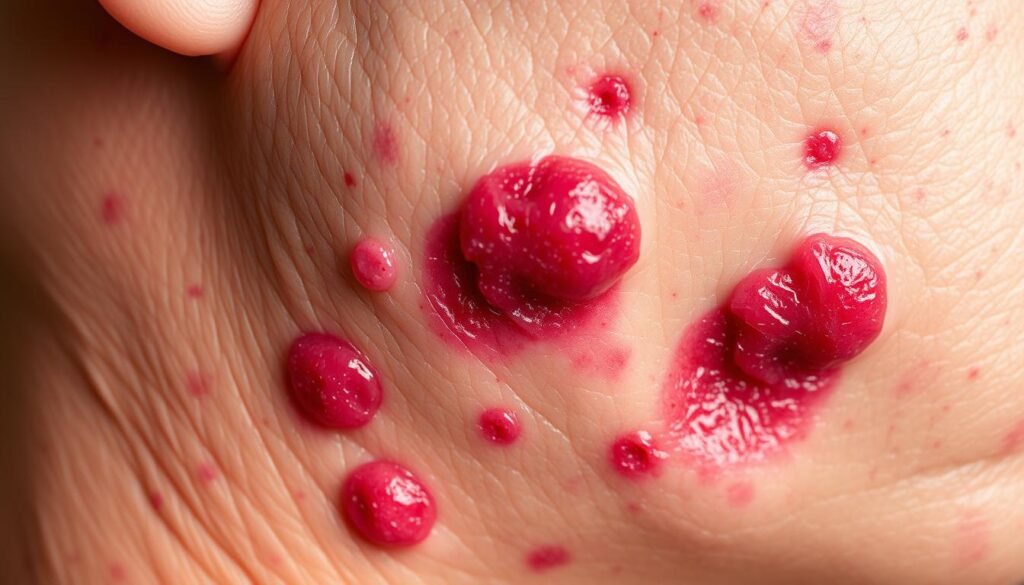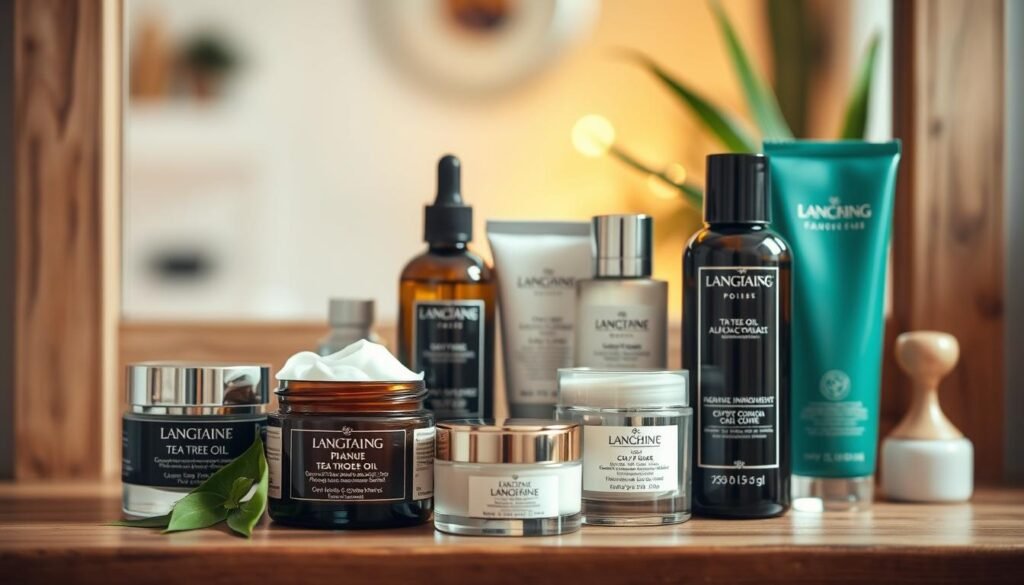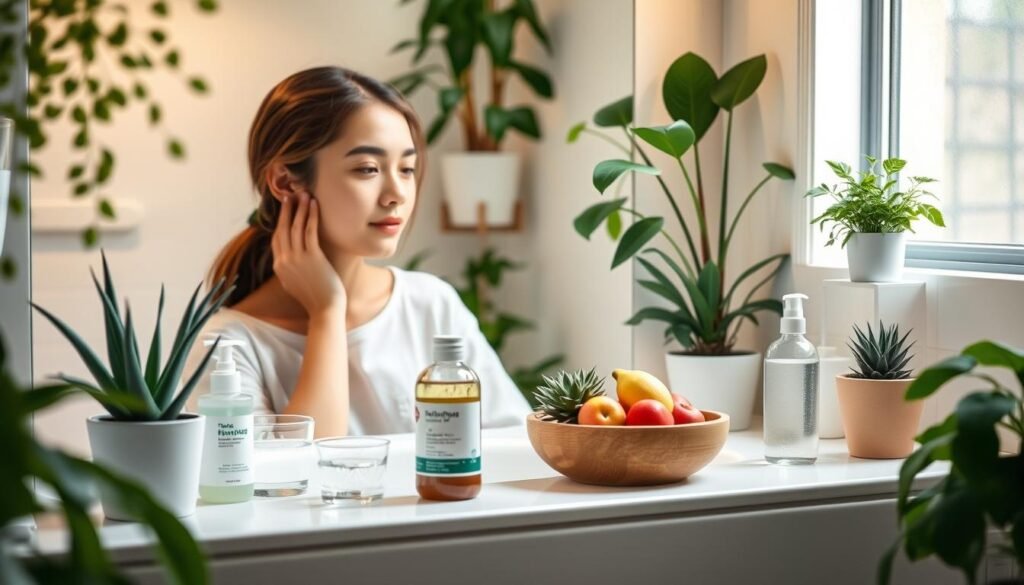About 50 million Americans battle with acne annually. Nearly 85% of young people face this skin issue. Nodular and cystic acne are among the worst types. They cause both emotional and physical pain. Knowing the difference between nodular acne vs cystic acne is key for finding the right acne treatment options. This knowledge allows people to get help early. Doing so helps avoid scars that can last a lifetime.
Key Takeaways
- Nodular and cystic acne are severe inflammatory acne types.
- Inappropriate treatment can lead to emotional distress and scarring.
- Timely intervention by a dermatologist is essential for effective treatment.
- Understanding the differences aids in selecting appropriate treatment methods.
- Both nodular and cystic acne may require more than just over-the-counter remedies.
Understanding Acne: A Common Skin Condition
Acne, also known as acne vulgaris, is common in people of all ages, especially teens. This condition appears when hair follicles clog up with too much oil, dead skin, and bacteria. This leads to red and swollen acne. It’s not just a physical issue; it affects emotions too.
Acne is a sign of a common skin condition, not bad health. The bumps and blemishes can make teens feel self-conscious. It’s vital to learn about acne because if it’s not treated, scars may form. These scars can affect a person’s feelings about themselves for a long time.
Acne is mostly found on the face, forehead, chest, back, and shoulders. These areas have more oil glands. Hormones changing during puberty can cause acne. Sometimes, women get acne as adults, especially around their periods.
To tackle acne, learning about different types helps. There are various treatments, from creams to pills. Acting early is key. For more details on acne types, check this resource on papule acne.
Types of Acne: An Overview
Acne is a common skin problem with different types. Knowing these types is key for good care and treatment. There are four main kinds: comedones, papules, pustules, nodules, and cystic acne. Each has unique features and can affect how you feel.
Comedones, which include blackheads and whiteheads, are the least severe form. They happen when hair follicles get blocked with oil and dead skin. Papules and pustules are red and can hurt. They might turn into nodules or cystic acne if they get worse. Hormonal changes, especially during puberty, often start these acne types.
Acne isn’t just on the face—it can also show up on the back and chest. Over half of people with acne get it on their back. And about 15% have chest acne. This issue can stay into adulthood, affecting around 3% of people over 35. There are treatments like creams and pills to help with acne.
https://www.youtube.com/watch?v=ys_R4KZYj24
Understanding the different types of acne helps in managing them better. Knowing what each type looks like aids in reducing outbreaks and improving skin health.
| Type of Acne | Description | Common Locations |
|---|---|---|
| Comedones | Non-inflammatory lesions; includes blackheads and whiteheads. | Face, back, chest |
| Papules and Pustules | Inflamed lesions; papules are red bumps, pustules contain pus. | Face, back, chest |
| Nodules | Large, painful lumps beneath the skin. | Commonly on face and back |
| Cystic Acne | Severe form characterized by large cysts filled with pus. | Face, back, chest |
What is Nodular Acne?
Nodular acne is a severe kind of acne that appears as deep, painful lumps under the skin. These lumps are hard, red, and can stay for a long time, often weeks or months. It’s important to know about nodular acne to treat and care for it properly.
Characteristics of Nodular Acne
People with nodular acne have solid, painful bumps bigger than usual pimples. These nodules won’t pop or drain, which keeps them painful. They form when dead skin cells, too much oil, and bacteria clog pores. This can lead to infection and swelling.
Causes of Nodular Acne
Nodular acne happens for many reasons. Hormonal changes, like during puberty or menstrual cycles, are usual causes. Also, genetics, how you care for your skin, and some medications can make it worse. Taking care of your skin well can help lower the risk of bad acne breakouts.
Treatment for this acne type often needs stronger options than what you find in stores. Doctors might suggest prescription meds, like antibiotics or retinoids, and creams. For detailed info on acne types, check out this resource.
What is Cystic Acne?
Cystic acne is a very serious type of acne. It appears as big, painful cysts deep under the skin. These are not just pimples but cysts filled with pus and are quite inflamed. This can lead to scars because of their depth in the skin. It’s often caused by hormone changes.
Characteristics of Cystic Acne
Cystic acne’s main sign is the deep, pus-filled cysts it forms. They are usually larger than 5mm and can hurt a lot. You’ll often find them around the jawline and mouth. Because they’re so deep and inflamed, they can leave scars unlike other types of acne.
- Painful, large cysts beneath the skin surface
- Higher likelihood of scarring
- Commonly appears on the lower face
- Often exacerbated by hormonal fluctuations
Causes of Cystic Acne
Hormonal changes, mostly by androgens, are the main cause of cystic acne. This happens a lot in puberty, menstrual cycles, and with PCOS. Also, your genes can make you more likely to get it, especially in certain ethnic groups.
| Factor | Impact on Cystic Acne |
|---|---|
| Hormonal Fluctuations | Increased sebum production, deep inflammation |
| Genetics | Higher risk if there is a family history of severe acne |
| Diet | Sugary foods and refined carbohydrates can worsen symptoms |
Key Differences Between Nodular Acne and Cystic Acne
Knowing the difference between nodular acne and cystic acne is key for right treatment. Both are severe acne types but have unique features. This knowledge guides treatment choices.
Nodular acne appears as large, firm, inflamed bumps. These bumps cause a lot of pain. They are deep in the skin and need a doctor’s help to avoid scars. These lumps can stick around for a long time, needing special care.
Cystic acne has big, fluid-filled bumps. They can pop and infect nearby skin. It can hurt a lot and may leave scars. Unlike nodular acne’s hard lumps, cystic ones feel softer. Both need a skin doctor’s attention when things get bad.
The table below points out the main differences between the two:
| Characteristic | Nodular Acne | Cystic Acne |
|---|---|---|
| Appearance | Large, firm, inflamed bumps | Large, pus-filled lesions |
| Pain Level | Often painful | Can be very painful |
| Risk of Scarring | High risk of scarring | Also high risk of scarring |
| Fluid Presence | None | Pus-filled |
| Treatment Necessity | Requires dermatological treatment | Requires dermatological treatment |
Dealing with either nodular or cystic acne matters a lot. Identifying what you have helps find the right help. This makes for better skin and life.
Nodular Acne vs Cystic Acne: Severity Levels
Nodular acne and cystic acne are severe. They cause pain and can change how your skin looks. It’s important to know how serious they are to treat them right. They can also make you feel very upset, beyond just skin problems.
Understanding Severe Acne Types
Nodular acne makes large, sore bumps under your skin. Cystic acne brings deep, pus-filled bumps. Things like hormone changes can start these acne types. This happens during puberty, periods, or pregnancy. There are many ways to treat this acne, like creams, pills, and seeing a doctor.
Impact on Emotional Wellbeing
Having severe acne can make you feel really bad inside. It can lead to feeling anxious, sad, and liking to stay alone. Knowing how it affects you both inside and out helps. It’s why getting help early is vital. If you have these acne types, you should look for treatments that help both your feelings and your skin. For more on treating acne, check this resource.

Treatment Options for Nodular Acne
Treating nodular acne requires a strong approach. Over-the-counter products are often not enough. Prescription meds, special creams, and expert care are key to dealing with this tough condition. If you’re facing nodular acne, look into all treatments and get advice from a skin doctor for the best plan.
Topical Treatments
Topical treatments are a first step in fighting nodular acne. These include:
- Benzoyl peroxide: It fights bacteria and opens pores, helping against inflamed acne.
- Salicylic acid: Removes dead skin and is found in face washes.
- Retinoids: Like adapalene, these work to unclog pores and you can buy them without a prescription.
Oral Medications
For tougher cases, oral medications might be needed. These options include:
- Isotretinoin: Very effective for severe nodular acne, but you must watch out for side effects.
- Antibiotics: They fight harmful bacteria, lower inflammation, and ease pain.
- Hormonal therapies: Birth control pills can balance hormones that cause acne in women.
Professional Interventions
Certain professional treatments can also help manage acne. These include:
- Chemical peels: They help peel off the outer skin layer, making acne scars less noticeable.
- Laser therapy: Good for severe acne cases, it improves skin feel and reduces marks.
- Blue light therapy: Kills acne-causing bacteria and decreases swelling.
Treating nodular acne takes time, often weeks, to see changes. It’s vital to get personalized advice for treatments that match your skin needs. For more info, check out this link.
| Treatment Type | Description | Effectiveness |
|---|---|---|
| Topical Treatments | Creams and gels applied directly to skin. | Moderate, works well for mild to moderate acne. |
| Oral Medications | Pills prescribed, including isotretinoin and antibiotics. | High, very good for severe acne. |
| Professional Interventions | Procedures by skin doctors like peels and laser treatment. | Very high, best for bad lesions or scars. |
Treatment Options for Cystic Acne
Cystic acne is tough and stubborn. It needs special treatment plans. Doctors often suggest combining prescription meds, creams, and other methods.
Dermatologist-Recommended Therapies
Doctors highly recommend certain meds for treating cystic acne. Creams like retinoids and antibiotics work on the surface. Pills such as doxycycline and Accutane help with severe cases.
These treatments take time, sometimes months or years, to clear the acne.
Long-term Management Strategies
Dealing with cystic acne long-term means keeping up with treatment and some life changes. Seeing a dermatologist regularly helps a lot. For less severe acne, treatments like light therapy and benzoyl peroxide are helpful.
It’s also good to have a gentle skincare routine. Stay away from things that can irritate your skin.
Importance of Professional Guidance
Getting help from an expert is key in fighting cystic acne. It’s important to see a dermatologist like Dr. Michele Green for a plan that fits you.
This way, you avoid making the acne worse or getting scars. Checking in with the doctor makes sure your treatment works well for you.

Daily Care for Preventing Nodular and Cystic Acne
For effective acne prevention, it’s vital to stick to a daily skin care routine. Over 50 million Americans deal with acne. Knowing how to handle it can really improve your skin’s health and look. Simple skin care habits can help avoid both nodular and cystic acne.
An effective daily skin care routine includes several important steps:
- Cleansing: It’s good to wash your face gently twice daily. This removes oil and dirt that can cause acne.
- Moisturizing: Pick moisturizers that are non-comedogenic. They keep your skin hydrated without clogging your pores.
- Spot Treatments: Use products with salicylic acid or benzoyl peroxide for active breakouts.
- Sun Protection: Daily sunscreen helps protect your skin from harmful UV rays that can worsen acne.
- Makeup Management: Choose makeup for acne-prone skin and always remove it before sleeping.
Choosing the right skincare products is key to preventing acne. Ingredients like retinol aid in skin renewal. Ceramides help maintain the skin’s barrier. This makes other acne treatments more effective.
If you often develop nodular or cystic acne, seeing a dermatologist regularly is wise. They can offer specific advice and more advanced treatment options. This can lead to clearer skin gradually. A skincare routine tailored to your needs is the best strategy for preventing acne. It can help your skin stay healthy and radiant.
| Daily Skin Care Steps | Recommended Ingredients | Benefits |
|---|---|---|
| Cleansing | Salicylic Acid, Benzoyl Peroxide | Removes excess oil, unclogs pores |
| Moisturizing | Ceramides, Hyaluronic Acid | Hydrates skin, maintains barrier function |
| Spot Treatment | Retinol, Tea Tree Oil | Reduces inflammation, promotes healing |
| Sun Protection | Broad-Spectrum SPF | Prevents UV damage, reduces redness |
| Daily Makeup Management | Non-Comedogenic Products | Reduces risk of clogged pores |
The Role of Lifestyle in Acne Management
Acne isn’t just about what you put on your skin. A healthy lifestyle plays a big role in reducing outbreaks. Things like what you eat, how much you sleep, and your stress levels matter. Let’s dive into how life choices affect your skin’s health.
Diet and Acne Prevention
Eating well is key for keeping your skin clear. Antioxidant-rich foods support healthy skin. But, diets high in processed foods can make acne worse. Here’s what you can do:
- Consume plenty of fruits and vegetables.
- Include whole grains and lean proteins.
- Stay hydrated by drinking enough water; aim for at least 2 liters daily.
- Limit fast food and sugary snacks to avoid spikes in insulin levels.
- Incorporate healthy fats, such as those found in fish and nuts.
Stress Management Techniques
Too much stress can lead to more acne. It causes your body to make more oil. To keep stress from affecting your skin, try these methods:
- Practice mindfulness and meditation to promote relaxation.
- Engage in regular physical activity to release endorphins.
- Establish a consistent sleep schedule to improve overall wellbeing.
- Explore hobbies and activities that bring joy to reduce stress.

When to Seek Help from a Dermatologist
If you have severe acne, like nodular or cystic types, getting help from a dermatologist is wise. These acne forms can seriously affect your look and feelings. They can also lead to scars if not treated. If your acne doesn’t get better with store-bought products, it’s time to see a pro.
About 85% of teens and many adults get acne. It hits 25% of men and 50% of women at some point. Men are more likely to get nodular acne. Women with PCOS might see their acne worsen due to hormone changes.
Scars and signs of infection mean you should see a skin doctor fast. They can offer strong treatments like isotretinoin and antibiotics. These can really help, but be patient—it might take months to see changes.
Getting help is key for your body and mind. Skin doctors provide the right care for you. Their help can boost your confidence and happiness.
| Signs to Consult a Dermatologist | Description |
|---|---|
| Persistent Acne | Acne that does not respond to over-the-counter medications. |
| Scarring | Development of scars from severe acne conditions. |
| Emotional Distress | Experiencing anxiety or depression related to skin issues. |
| Infection Symptoms | Signs that may be mistaken for nodular acne, necessitating professional assessment. |
Long-term Outlook for Nodular and Cystic Acne
People with nodular and cystic acne have a future that depends on their treatment choices. The timing of their treatments is key. Getting help early can lessen the risks that come with serious acne.
This includes scars that might harm their self-esteem. Taking action early is crucial for better skin outcomes.
Potential Scarring from Severe Acne
Nodular and cystic acne can lead to big scarring issues if not handled right. Scars often happen when acne isn’t treated or if a person picks at their skin. Knowing about these scars is important, as they can stay and be hard to get rid of.
To avoid scarring, start with good treatment and skin care. This helps keep your skin clear and healthy.
Importance of Early Intervention
Early action is essential for dealing with nodular or cystic acne. It means you can get treatment sooner, which reduces the chance of lasting damage. Options like anti-androgens and isotretinoin are more effective early on.
Meeting with a skin doctor can create a plan that helps now and in the future. It’s about more than just quick fixes; it’s looking after your long-term skin health.
Conclusion
Knowing the difference between nodular acne vs cystic acne is key to treating it right. Each has its own issues, so it’s important to tell them apart. This way, you can get the correct medical advice. Nodular acne can be tougher to deal with, often needing drugs like oral antibiotics and isotretinoin.
Good skincare and early help are critical to ease both the physical and mental impacts. If you have nodular or cystic acne, seeing a dermatologist is a smart move. They can guide you to the best understanding acne treatment for you. Getting professional help can make your skin better and boost your confidence.
Learning about acne and having a good skincare routine are very important steps. Being well-informed and careful can help you manage your acne. This leads to clearer skin and a better life.